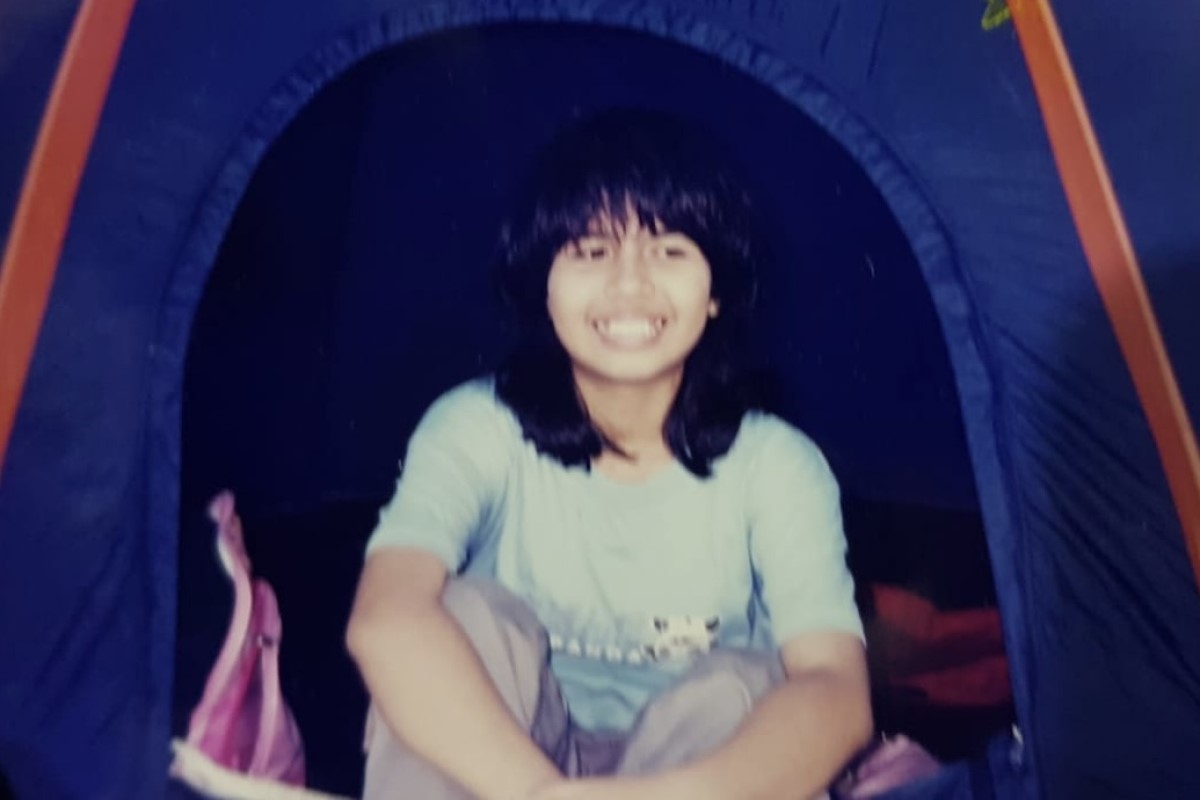Top image: The author at nine.
All images: Cam Khalid
When friends and well-meaning folks ask about my relationship with my mother, I would say, “It’s complicated”. But that would be putting it rather mildly.
Naturally, people would assume that the bond between a mother and her child is unbreakable. That blood is thicker than water. Society has convinced us that our mother is a de facto source of love. The lack thereof then has us questioning ourselves: “What is wrong with me?”
ADVERTISEMENT
Although I didn’t—and still don’t—have the best relationship with my mother, I don’t have feelings of deep disdain for her either. Let’s say I love her, but I can’t stand her most times.
However, there were nuance and tender moments, but these were usually pierced with stalactite. My mother never believed in hitting her children. Still, her criticisms were so relentless, so passive-aggressive, that they hurt just as bad.
When I was younger, I asked my mother: “Do you actually love me?” Her response? “Of course, I love you. I love all my children the same.”
“So why don’t you show me love the way you show [my other siblings]?”
“Because you never wanted me to.”
I carved our wood dining table with the words:
“I hate Ibu”
Late 1990s: ‘Hate’ is a strong word
Growing up, I would do everything to warrant praise and attention. I wanted to be listened to and talked to nicely. I wanted to be held.
When I fell, I wanted my mother to kiss my boo-boos, hug me, and tell me everything will be okay. Instead, I would curl up in a corner with my bloodied knee, crying to sleep out of fear of showing my mother how clumsy I was. Disappointing her was the last thing I wanted.
As a child who was neither emotionally stoic nor silent, rarely hearing my mother comforting me, singing my praises or uttering “I love you” made me feel invisible. I became resentful and felt abandoned when my efforts went unnoticed.
I eventually deduced that my mother didn’t love me.
When I was about seven, I carved our wood dining table with the words: “I hate Ibu”. Okay, maybe ‘hate’ is a strong word, but the dislike for her was strong too. I wanted her to see it, but at the same time, I was frightened of the outcome. So I covered the act of vandalism with the table cloth, slightly ashamed of what I had done.
Days passed, and there was no mention of the carving. I recall having the dining table replaced when we moved houses. I was sure that my mother saw it, but I don’t think she ever confronted me about it. She never really asked if I meant what I wrote, though, but I remembered that I very much meant it at that time.
ADVERTISEMENT
2000s: Tough love, no talk approach
Our rocky relationship continued to last for over a decade complete with explosive outbursts, scream fests, and door slams. I even graduated from carving tables and scribbling notepads to yelling “I hate you!” as soon as I hit puberty.
Still, despite being at each other’s throats, we never got into a physical altercation. However, we have had our fair share of hitting and throwing objects aimlessly to express our outrage.
These intense rages would then be followed by days of silent treatment until one of us caved in. And let’s put it this way: she’d say anything else but admit she was wrong. Nonetheless, the verbal battles weren’t significant enough for us to cease all communication, even though I was close to doing so.
When I was 13, our big fight finally led me to run away from home after school, believing I could survive the wilderness without mummy dearest.
But I couldn’t do it. I sat on an empty bench at the nearby playground, clutching my duffel bag, contemplating whether I should return home. The minute the clock hit midnight, I decided to make the walk of shame home.
I came home to two police officers at the door and my mum rushing to me, telling me she was worried. Behind closed doors, she started yelling at me, calling me “ungrateful.” I didn’t think I was. I just had enough of the rows.
At 19, I was officially diagnosed with depression. A part of me blamed my mother.
I understood the whole filial piety assignment, so I usually try to avoid conflict. But I have to admit that I was partly to blame for the explosive outbursts—thanks to mood swings and teen aggression.
ADVERTISEMENT
Nonetheless, every argument began with my mother picking on me, whether it was about my clothes or how much weight I had put on. She would make me feel bad about myself, pin the blame on me for having low self-esteem, and guilt-trip me for not listening to her. She called it “tough love.” I called it “emotional abuse.”
It felt as if she was knocking down my confidence to exert certain control over me without directly doing so—think bad cop, good cop. The worst thing was that I fell for the bait.
Her mind games made me fearful. It even traumatised me to the point that I was scared to talk to her, let alone run away from home for good.
By the age of 16, I brought up my mother’s attitude toward me countless times when speaking to a school counsellor or therapist.
At 19, I was officially diagnosed with depression. A part of me blamed my mother.
As a child, I felt emotionally neglected, invisible to her (and even my father’s) eyes, and unworthy of attention and affection. While I was more visible to my mother as a teenager, I was emotionally abused, constantly plagued by comments about my weight and looks. And if I were to express any emotion, she would deny my feelings, labelling me as “sensitive.”
There were no bruises or scars to mark a bad childhood. All my physical needs, such as food, clothing, shelter, and education, were provided. Mum has also always pushed me to chase my dreams, especially in creative writing, usually frowned upon by more traditional Asian parents. She also enrolled me in after-school programmes and tuition classes to ensure that I got all I needed to do well in school and level up.
However, the lack of emotional affection, attention, and validation scarred me. These had significant impacts on my mental health, carrying over to adulthood. I vowed never to have children for fear of history repeating itself.
2010s: Distance makes the heart grow fonder
When I was 20, I decided to pack my bags and move out 6,000 miles away, hoping that the distance would do us good. She gave me her blessing on account that I remain in contact.
For the first few weeks, I was pinging her day and night, letting her know what I was up to and how I was doing. Still, what was a normal conversation would then become heated. My mother would start raising her voice and talking over me.
Even via text, I wasn’t spared. She would capitalise everything and use exclamation marks in abundance. Staying in contact became a chore. We started to communicate lesser, and when we do, it’s comparable to awkward, surface level, small talk. It makes me cringe even thinking about it now.
ADVERTISEMENT
Things took a turn five years later when I was left heartbroken after a failed relationship, and all I wanted was my mummy to cry to. But instead of comforting words, all I got was a terse “Maybe it was you who ruined the relationship. You’re not easy to be with.”
A week later, still feeling sad and lost, I went to a tarot card reader to find a new direction in my love life. But as I was about to leave the dim-lit shop, a lady approached me, asking me if she could read my aura and palm.
As she held my palms up, she asked: “How is your relationship with your mum?” Shocked, I nervously laughed but gave her no concrete answer. She said: “Reach out and reconcile with her, even if it’s difficult.”
I thought it was a bizarre encounter, given that I had not mentioned my mother and our strained relationship.
“I’ve always loved you,” my mother reassured me.
A couple of weeks later, I left a screening of Lady Bird a little teary-eyed. Some elements between the mother-daughter duo struck a chord with me, especially the poor communication and personal hangups.
Together with the movie’s effects, the journey home made me reflect on my relationship with my mother. While at times toxic, the occasional tender moments made me rethink my next steps — whether to walk away or bury the hatchet and find a way to make it work. I decided to choose the latter because there was still a hopeful part of me.
Although the damage has been done, I was more than happy to make positive changes for the better.
Remembering the aura reader’s advice, I rang my mother. It had been over three months since our last phone call. Even if she could not be the maternally warm mummy I wanted (and needed), I could at least maintain a civil relationship with her.
The moment she answered the phone, I remember bawling my eyes out. I poured my heart into the call, sharing profound feelings about our relationship, how it has affected me, and how I longed for a mother who still cradles her emotional adult daughter. It was the first honest heart-to-heart I had with her in years.
“I’ve always loved you,” my mother reassured me between my sobs.
Since we cleared the air, our conversations became more regular and civil—fewer scream queens; more live, love, laugh. She also started to end our chats with “I love you” rather than the cold “Okay, bye” she used to mutter.
ADVERTISEMENT
The more I spent time with my mother, albeit the long distance, the more I realised that she never meant to be a terrible mother. It also made me take a hard look at myself and reflect on how I behaved as her eldest daughter. It became immediately apparent that I was not treating her respectfully, often cutting her mid-conversation, something I consciously refrained from doing to others who weren’t family.
Early 2020s: Entering motherhood
As my relationship with my mother improved, I began to see my mother in a new light.
I have always respected my mother, although I have not been the most reverential, especially as a teenager. But now that we’re both adults, there’s new regard there. Today, she’s more supportive and more understanding. It allows me to have transparent and honest tête-à-têtes with her.
The more I think about my childhood, the more I realise the tremendous amount of gratitude I have for all the other things she did for me.
Surprisingly, this newfound mother-daughter relationship changed my mind about having children. As I’m writing this, I’m now 21 weeks pregnant and looking forward to celebrating Mother’s Day with both my mother and my cute little bump.
With my little one, I plan to drop the tough love approach. It didn’t work for me and traumatised me as a child. Even today, I still have nightmares about my mum despite our improved relationship.
I still hold my mother responsible for my traumatic childhood. But I also understand that it is my responsibility as an adult to heal from that trauma, correct bad behaviours, and make amends.
There are complicated aspects of her personality that will never change. Still, I can alter how I react and manage them. I could just as quickly call it a day and walk away from the toxic relationship. But deep down, I know that my mother needs me in her life, and I don’t have the heart to leave her despite decades of tension.
Today, I think a lot about showing unconditional love to my child, making sure they feel seen and heard without turning them into spoiled brats. It might be a fine line, but it is one I am determined to walk.



